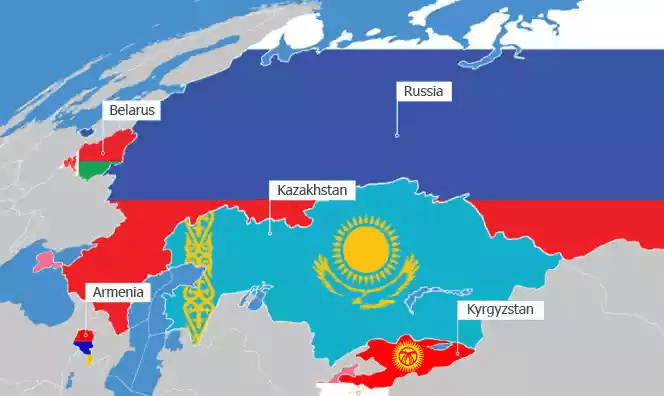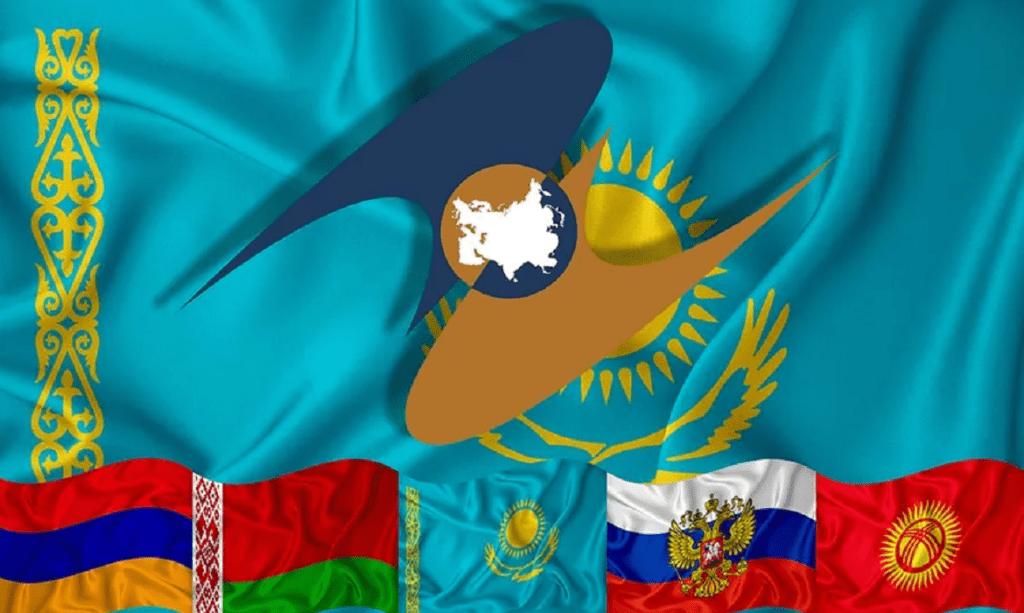By Aleksandra Khramova
From the beginning, the most controversial participant in the Eurasian Economic Union (EEU) has been the Republic of Kazakhstan. As a member of the Eurasian Economic Union, Kazakhstan invariably adheres to the exclusively economic cooperation nature of EEU, but generally does not accept its interaction in the social, educational or environmental fields.

The overriding principle for Kazakhstan is the preservation of its national sovereignty. so any cooperation not related to the economy is perceived by the country’s leadership as an encroachment on this principle.
Nowadays the Eurasian Economic Union (EEU) and its member states suffer from the toxic influence of Russia and economic sanctions imposed on it.
A key point to analyze is whether Kazakhstan is likely to remain in the orbit of Russian influence as a member of the EEU or will risk choosing an independent future. The geostrategic course Kazakhstan will take could define the future of the Eurasian region.
Kazakhstan for the EEU
The Eurasian Economic Union is the regional economic organization established in 2015 by Russia, Belarus and Kazakhstan, with Armenia and Kyrgyzstan joining later. Kazakhstan holds sacred significance for the EEU because it has always positioned itself as the main ideologue of Eurasian integration, ever since former President Nazarbayev’s famous speech in 1994, when he suggested building a “Eurasian home” for former Soviet republics eager to salvage economic, civil and cultural connections between them.
Economically, Kazakhstan accounts for 10.5 percent of domestic trade and 9.3 percent of the EEU’s GDP. This is a significant share considering that most of the trade and GDP are realized from Russia (63.1 percent and 86.3 percent, respectively). Many goods arrive in the EEU through Kazakhstan, mainly from China. Without this country, the EEU could lose its meaning. The Kyrgyz Republic would remain separate from the rest of the EEU territory because it is connected to it through Kazakhstan. Considering also that Armenia is not directly connected to the EEU area, the Union without Kazakhstan would appear very disunified.

Geopolitically, Kazakhstan is a wide and powerful country in Central Asia which is balancing between Russia, the West, China and Turkey. It’s a hard position but due to its diplomatic game and demonstrable neutrality, it succeeds for the current moment. Without this Central Asian leader, the EEU would remain just a Union of Russia and Belarus with satellites-Armenia and Kyrgyzstan-which in the medium term would most likely drift toward Western and Eastern civilizations respectively.
It seems that Russia does everything to keep Kazakhstan in its zone of influence, as one of the few fragments of the Soviet empire loyal to Russia. For example, for the first and only time, troops from the Collective Security Treaty Organization (CSTO) entered Kazakhstan in January 2022 to hold up a falling political regime while the threats to it were mainly internal in nature. According to the CSTO agreement, participants help partners in case of external aggression. Presumably, this was not only because the Kazakh government asked for such help, but because it was profitable and necessary for Russia itself. In comparison, the CSTO refused similar assistance to Armenia when the country asked for help in resisting attacks by Azerbaijan in September 2022. The fact is that Russia is very dedicated to its special military operation in Ukraine to afford the opening of the second front line in Armenia and believes that Armenia is more reliable for Russia and will not stray from the Russian eagle wing.
The EEU for Kazakhstan
Aside from the obvious economic benefits, including freedom of movement of goods, services, capital and labor, and access to the large market for Kazakh goods that may not be as competitive in the global market, there are other reasons to remain in the EEU for Kazakhstan, especially now at such a difficult time for the Eurasian region. First, because Russia is under economic sanctions and has imposed retaliatory sanctions, many global companies come to Kazakhstan to gain covert access to the Russian market on a large scale that has been lost, such as through the use of repackaging.
Kazakhstan is attractive to foreign business and investment because it has natural resources, cheap labor and even a special economic zone in the Astana International Financial Center with British laws and Western specialists. But the appendix of the Russian market of 140 million people is also a good stimulus. The second reason is that during 2022 many highly qualified Russian specialists moved here. Since many of them come from the IT sector, this can really boost Kazakhstan’s innovative and technological sphere.
Speaking of geopolitical issues, through Russia Kazakhstan has access to the world water transportation system, being a country that does not have access to open seas. Another reason for good neighborly relations with Russia is the fear that “big brother” may recall the view that Kazakhstan’s northern territories are historically more Russian than Kazakh and that there are many ethnic Russians living there who may demand protection of their interests from their historical homeland.
Today Kazakhstan lies at the crossroads of Slavic Orthodox, Islamic, and Chinese civilizations, and major “fault lines” of civilization pass through its territory. The polyconfessional nature of the country is explained by the different peoples living on its territory: the Turks profess Islam, the Russians Christianity, the Germans Protestantism, and so on. Kazakhstan’s official language is Kazakh, but Russian also has official status. Experts have serious concerns about Kazakhstan: Kazakhstan is too young and insufficiently established on the international stage. Secular civilizations are not created in a short time. Therefore, the dissolution of Islamic or Chinese civilization (much less tolerant than Russia’s) threatens Kazakhstan in perspective. Now, while Russia can counterbalance the weight of China, Kazakhstan is able to balance between them as an independent state.
Kazakhstan claims leadership in the Central Asian region and thus competes with Uzbekistan and China. Eurasian integration for Kazakhstan is a method of achieving a greater role in the region, integrating into the global system of world trade, attracting investment, and maintaining friendly relations with Russia, including the large number of Russians living on its territory. For Russia, Kazakhstan is a reliable ally in Central Asia, an unstable region given the flow of arms, drugs and the spread of extremism and terrorism.
Thus, despite the intention to translate the Kazakh alphabet from Cyrillic to Latin, political reforms aimed at decentralizing power introduced by President Tokaev, and the open non-recognition of new regions joining Russia, Kazakhstan and Russia are still interested in each other and have many pragmatic reasons to stay together, especially as long as the EEU exists.
Author: Aleksandra Khramova – Expert in Russian and Eurasian Studies with 9 years of experience in an international organization and an equal background in Higher Education with a status of PhD Candidate (International Relations, Trade, Security, Political Science, Global and Area Studies).
(The views expressed in this article belong only to the author and do not necessarily reflect the views of World Geostrategic Insights).







